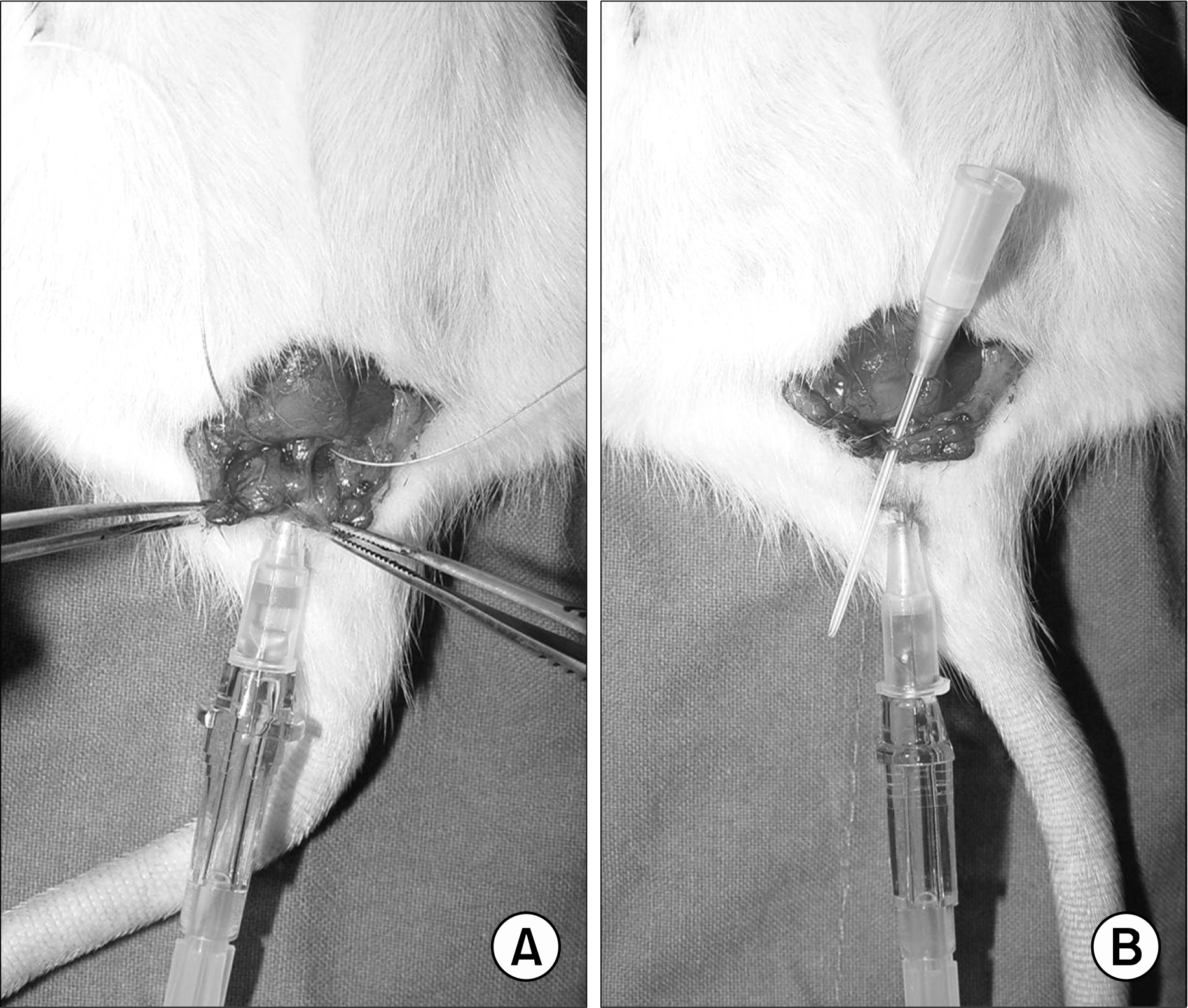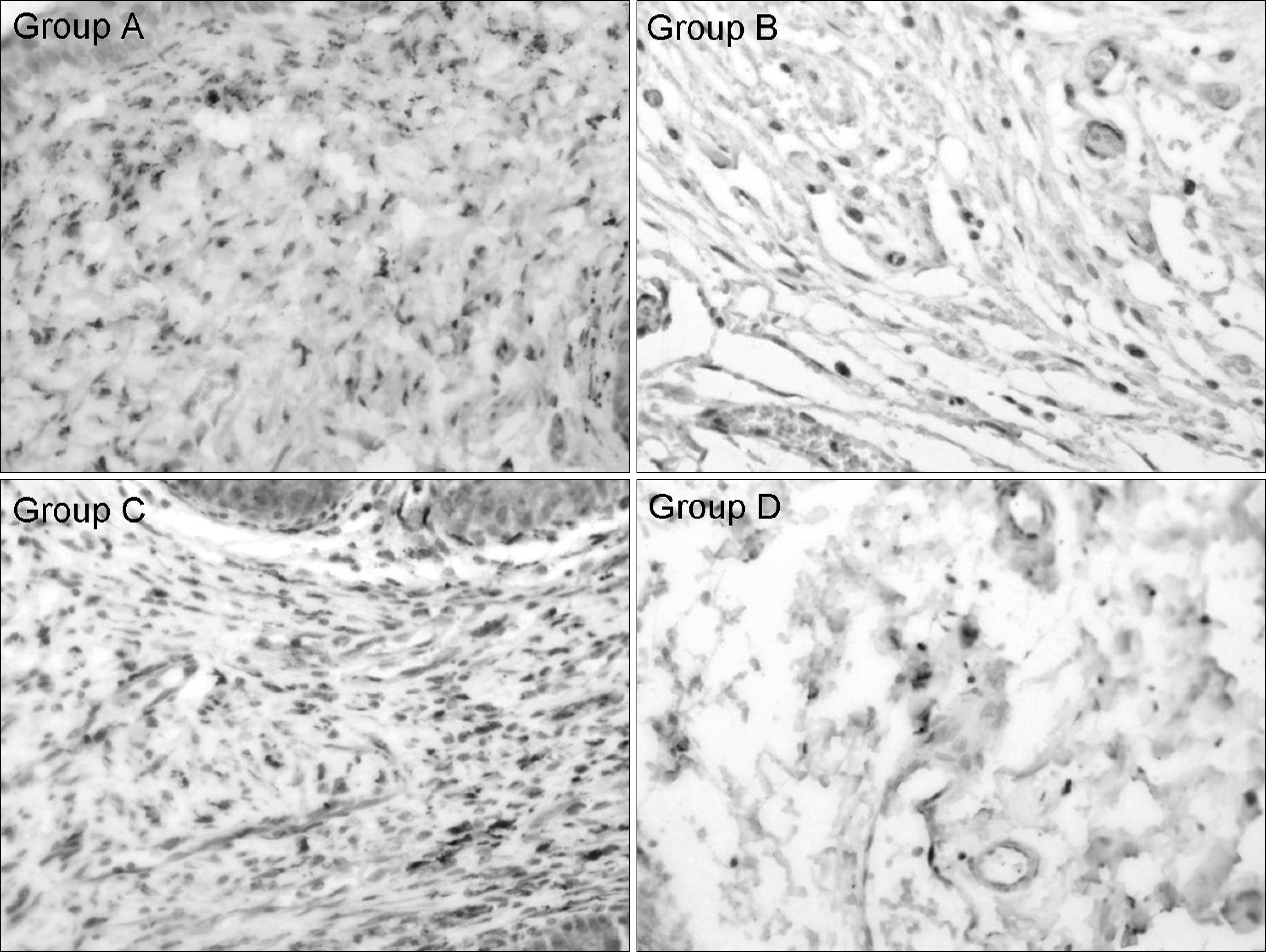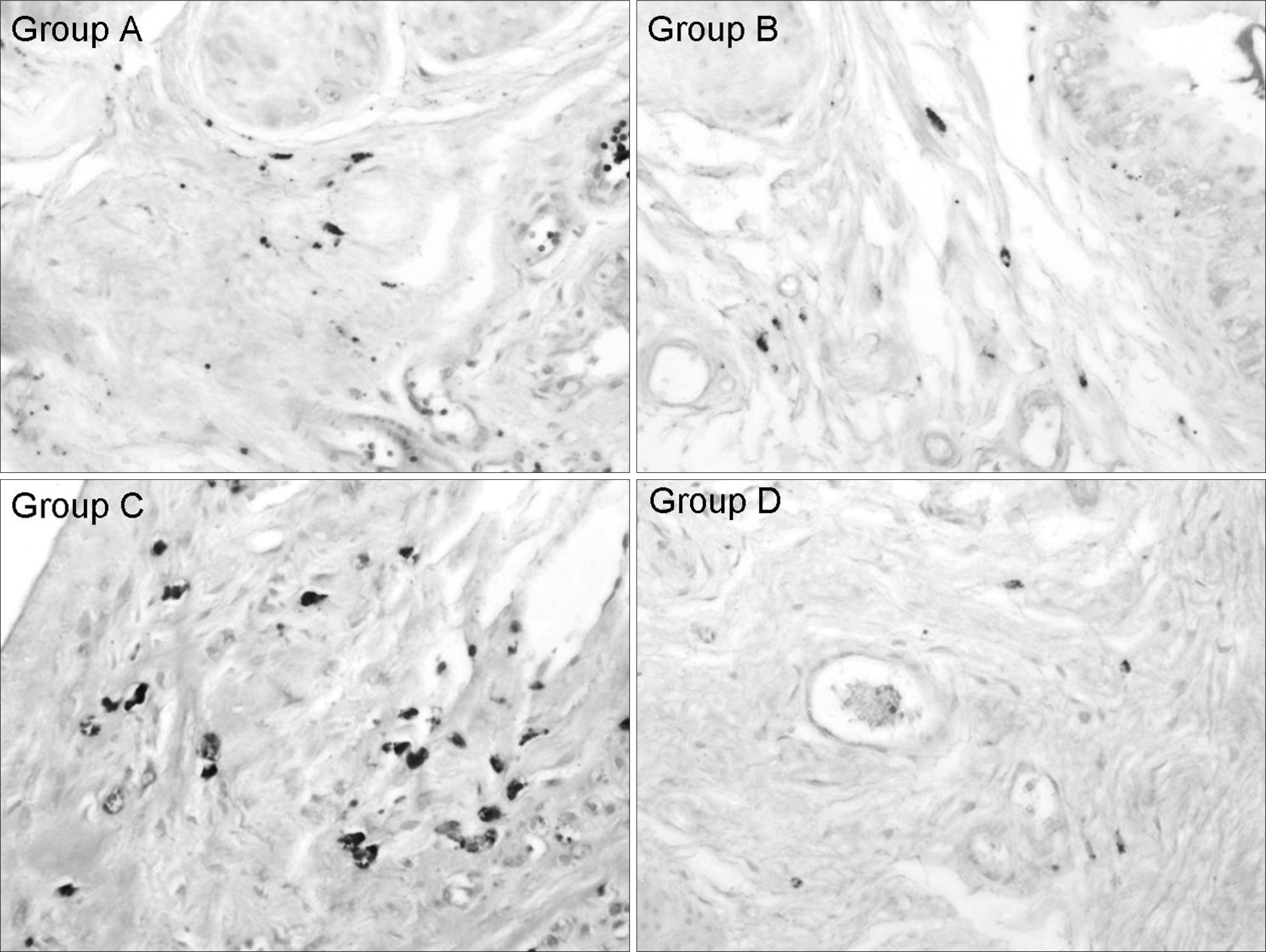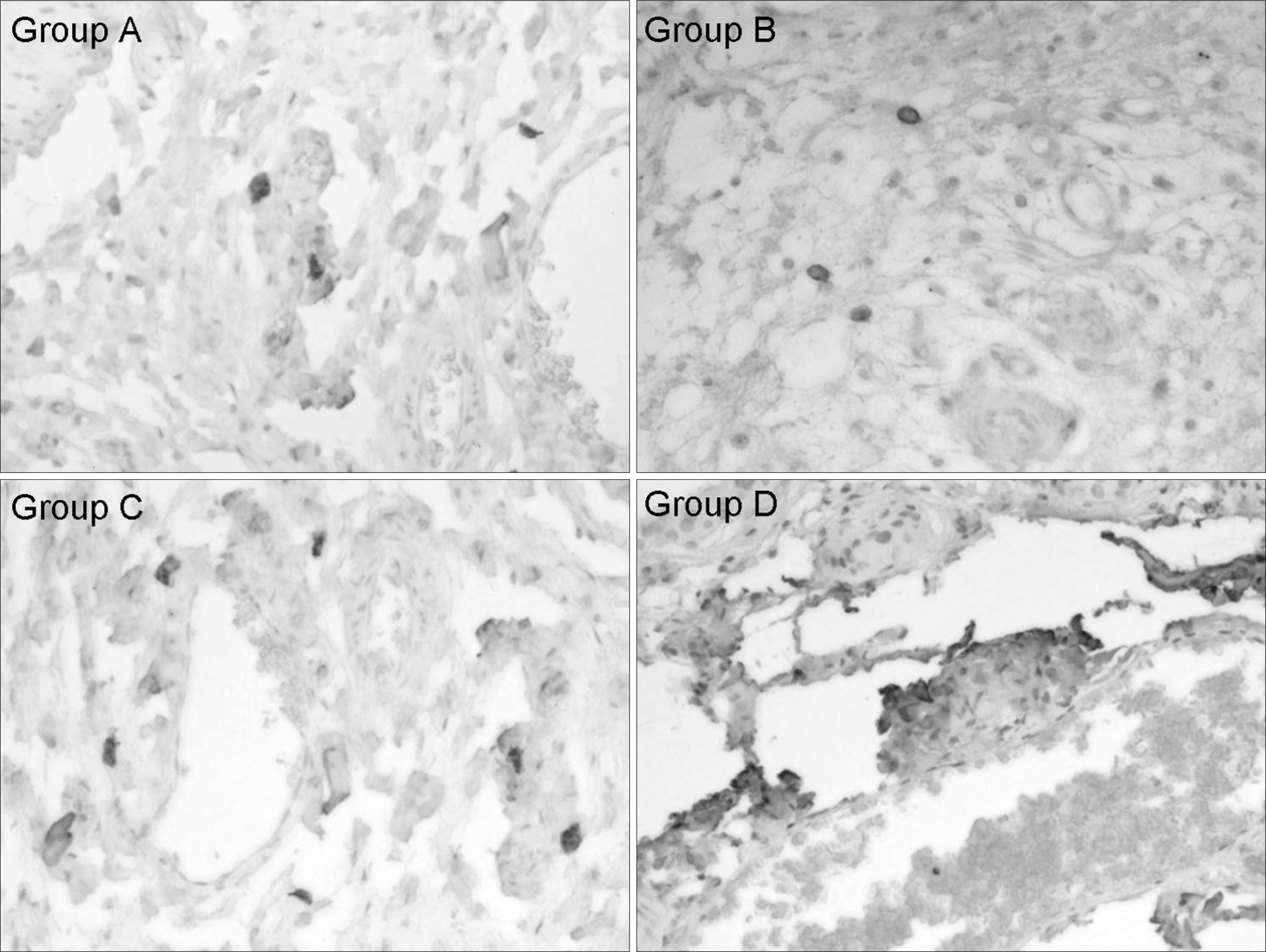Korean J Urol.
2008 Mar;49(3):227-236. 10.4111/kju.2008.49.3.227.
Effect of a Prolyl 4-hydroxylase Inhibitor on Bladder Fibrosis in a Rat Model of Partial Bladder Outlet Obstruction
- Affiliations
-
- 1Department of Urology, College of Medicine, Kosin University, Korea.
- 2Department of Pathology, College of Medicine, Kosin University, Korea.
- 3Department of Urology, Moonhwa Hospital, Korea.
- 4Department of Urology, College of Medicine, Pusan National University, Busan, Korea. lsd@pusan.ac.kr
- 5Medical Reserch Institute, Pusan National University, Busan, Korea.
- KMID: 1204624
- DOI: http://doi.org/10.4111/kju.2008.49.3.227
Abstract
-
PURPOSE: This study was performed to investigate prolyl 4-hydroxylase (P4H) expression changes and an inhibitor-mediated effect on bladder fibrosis in rats with partial bladder outlet obstruction(PBOO).
MATERIALS AND METHODS
Twenty female Sprague-Dawley rats were divided into four groups. Group A(n=5) consisted of rats with PBOO treated with 2mg/kg P4H inhibitor, group B(n=5) consisted of rats with PBOO treated with 20mg/kg P4H inhibitor, group C(n=5) consisted of rats with PBOO treated with normal saline and group D(n=5) consisted of normal control animals. After PBOO for two weeks in the A, B, and C group rats, each amount of inhibitor was administered orally once a day for two weeks. After a total of four weeks, the bladders from all of the group rats were removed and evaluated.
RESULTS
The muscle thickness calculated from Masson's trichrome staining was 0.85+/-0.22mm, 1.06+/-0.15mm, 1.19+/-0.30 and 0.49+/-0.10mm for group A, B, C, and D rats, respectively. The overall P4H expression was 65.7+/-15.2%, 13.4+/-8.4%, 73.8+/-15.5% and 10.0+/-10.0% for group A, B, C, and D rats, respectively. The overall collagen I protein expression was 16.9+/-18.0%, 17.0+/-24.1%, 30.5+/-13.4% and 8.8+/-8.7% for group A, B, C, and D rats, respectively. The overall collagen III protein expression was 9.6+/-4.2%, 8.8+/-2.9%, 12.5+/-10.6% and 7.5+/-3.5% for group A, B, C, and D rats, respectively. These results showed that PBOO led to increased muscle thickness and to an increased expression of P4H, collagen I and III protein, as compared with the group D control animals. Muscle thickness and expression of P4H, collagen I and III protein was decreased in rats treated with the P4H inhibitor-treated groups decreased as compared with rats in group C (saline-treated animals). The ratio of collagen I/III was 1.8, 1.9, 2.4 and 1.2 in group A, B, C, and D rats, respectively.
CONCLUSIONS
Our results suggest that the P4H inhibitor may be potentially utilized to reduce bladder fibrosis caused by PBOO.
Keyword
Figure
Reference
-
1. Ishimaru T, Kanamaru T, Takahashi T, Okazaki H. Inhibition of prolyl hydroxylase activity and collagen biosynthesis by fibrostatin C, a novel inhibitor produced by streptomyces catenulae subsp. griseospora No. 23924. J Antibiot. 1988; 41:1668–74.
Article2. Bickel M, Baader E, Brocks DG, Engelbart K, Gunzler V, Schmidts HL, et al. Beneficial effects of inhibitors of prolyl 4-hydroxylase in CCl4-induced fibrosis of the liver in rats. J Hepatol. 1991; 13(Suppl 3):S26–33.
Article3. Hurych J, Chvapil M, Tichy M, Beniac F. Evidence for a faster degradation of an atypical hydroxyproline and hydroxylysine deficient collagen formed under the effect of 2,2'-dipyridyl. Eur J Biochem. 1967; 3:242–7.
Article4. Kasper M, Fuller SD, Schuh D, Müller M. Immunohistological detection of the beta subunit of prolyl 4-hydroxylase in rat and mini pig lungs with radiation-induced pulmonary fibrosis. Virchows Arch. 1994; 425:513–9.
Article5. Matsui H, Kubochi K, Okazaki I, Yoshino K, Ishibiki K, Kitajima M. Collagen biosynthesis in gastric cancer: immunohistochemical analysis of prolyl 4-hydroxylase. J Surg Oncol. 1999; 70:239–46.
Article6. Sasaki T, Holeyfield KC, Uitto J. Doxorubicin-induced inhibition of prolyl hydroxylation during collagen biosynthesis in human skin fibroblast cultures. Relevance to imparied wound healing. J Chin Invest. 1987; 80:1735–41.
Article7. Majamaa K, Sasaki T, Uitto J. Inhibition of prolyl hydroxylation during collagen biosynthesis in human skin fibroblast cultures bt ethyl 3,4-dihydroxybenzoate. J Invest Dermatol. 1987; 89:405–9.8. Karvonen K, Ala-Kokko L, Pihlajaniemi T, Helaakoski T, Henke S, Günzler V, et al. Specific inactivation of prolyl 4-hydroxylase and inhibition of collagen synthesis by oxapro-line-containing peptides in cultured human skin fibroblasts. J Biol Chem. 1990; 265:8415–9.
Article9. Tschank G, Brocks DG, Engelbart K, Mohr J, Baader E, Günzler V, et al. Inhibition of prolyl hydroxylation and procollagen processing in chick-embryo calvaria by a derivative of pyridine-2,4-dicarboxylate. Characterization of the diethyl ester as a proinhibitor. Biochem J. 1991; 275:469–76.
Article10. Fuller GC. Perspectives for the use of collagen synthesis inhibitors as antifibrotic agents. J Med Chem. 1981; 24:651–8.
Article11. Sakaida I, Okita K. New prolyl 4-hydroxylase inhibitor reduces procollagen gene expression and enzyme-altered lesions in rat liver cirrhosis. J Gastroenterol Hepatol. 1995; 10(Suppl 1):): S63-4.
Article12. Böker K, Schwarting G, Kaule G, Günzler V, Schmidt E. Fibrosis of the liver in rats induced by bile duct ligation. Effects of inhibition by prolyl 4-hydroxylase. J Hepatol. 1991; 13(Suppl 3):S35–40.13. Kawaguchi Y, Harigai M, Kitani A, Suzuki K, Kawakami M, Ishizuka T, et al. Effect of prolyl 4-hydroxylase inhibitor on fibroblast collagen production in vitro: an approach to the treatment of systemic sclerosis. J Rheumatol. 1992; 19:1710–5.14. Lee SD, Akbal C, Miseeri R, Jung C, Rink R, Kaefer M. Collagen prolyl 4-hydroxylase is up-regulated in an acute bladder outlet obstruction. J Pediatr Urol. 2006; 2:225–32.
Article15. Shapiro E, Becich MJ, Perlman E, Lepor H. Bladder wall abnormalities in myelodysplastic bladders: a computer assissted morphometric analysis. J Urol. 1991; 145:1024–9.16. Gilpin SA, Gosling JA, Barnard RJ. Morphological and morphometric studies of the human obstructed, trabeculated urinary bladder. Br J Urol. 1985; 57:525–9.
Article17. Noh JY, Han SW, Kim JH, Kim CS, Hong CH. What causes bladder fibrosis?: abnormal innervation or abnormal bladder dynamics. Korean J Urol. 2003; 44:1058–63.18. Levin RM, Hass MA, Bellamy F, Horan P, Whitbeck K, Chow PH, et al. Effect of oral Tadenan treatment on rabbit bladder structure and function after partial outlet obstruction. J Urol. 2002; 167:2253–9.
Article19. Lee AK, Sung YS, Kim KM, Choi H, Kim SW. Early expression of collagen type I, III and IV and Matrix- Meta-lloproteinase (MMP)-2 mRNA in the rat bladder subjected to partial outlet obstruction. Korean J Urol. 1998; 39:213–22.20. Elbadawi A. BPH-associated voiding dysfunction: detrusor is pivotal. Contemp Urol. 1994; 6:21–38.21. Mattiasson A, Uvelius B. Changes in contractile properties in hypertrophic rat urinary bladder. J Urol. 1982; 128:1340–2.
Article22. Kim KM, Kogan BA, Massad CA, Huang YC. Collagen and elastin in the obstructed fetal bladder. J Urol. 1991; 146:528–31.
Article23. Ewalt DH, Constantinesco S, Howard PS, Blyth B, Snyder HM, Duckett JW, et al. Increased collagen type III in the neurogenic non-compliant bladder. J Urol. 1992; 147:438A.24. Ewalt DH, Howard PS, Blyth B, Snyder HM 3rd, Duckett JW, Levin RM, et al. Is laminar propria matrix responsibie for normal bladder compliance? J Urol. 1992; 148:544–9.25. Winter AD, Page AP. Prolyl 4-hydroxylase is an essential procollagen-modifying enzyme required for exoskeleton formation and the maintenance of body shape in the nematode Caenorhabditis elegans. Mol Cell Biol. 2000; 20:4084–93.26. Kukkola L, Hieta R, Kivirikko KI, Myllyharju J. Identification and characterization of a third human, rat, and mouse collagen prolyl 4-hydroxylase isoenzyme. J Biol Chem. 2003; 278:47685–93.
Article27. Nissi R, Autio-Harmainen H, Marttila P, Sormunen R, Kivirikko KI. Prolyl 4-hydroxylase isoenzymes I and II have different expression patterns in several human tissues. J Histochem Cytochem. 2001; 49:1143–53.
Article28. Berggren T, Uvelius B. Cystometrical evaluation of acute and chronic overdistension in the rat urinary bladder. Urol Res. 1998; 26:325–30.
Article29. Mostwin JL, Karim OM, van Koeveringe G, Books EL. The guinea pig as a model of gradual urethral obstruction. J Urol. 1991; 145:854–8.
Article
- Full Text Links
- Actions
-
Cited
- CITED
-
- Close
- Share
- Similar articles
-
- Effect of Bladder Outlet Obstruction on Blood Flow and Tissue Collagen in Rat Bladder
- The Role of Peripheral and Spinal alpha1-adrenoceptor in Bladder Overactivity Induced by Partial Bladder Outlet Obstruction in Rat
- Ultrastructural Changes of Detrusor Muscle by Partial Obstruction of the Bladder Outlet in the Rat
- Morphometric Analysis of the Collagen Changes Induced by Subcutaneous Injection of Interferon-gamma following Bladder Outlet Obstruction in the Rat
- Changes in Detrusor and Urinary Growth Factors According to the Bladder Function after Partial Bladder Outlet Obstruction in Rat






